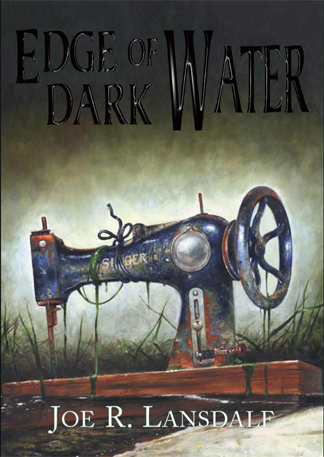
|
|
Reading Review:
Edge of Dark Water by Joe R. Lansdale
by Michael Channing

Joe R. Lansdale knows East Texas. Most, if not all, of his books have been set in that region. Which is to be expected as he's lived there all his life. But not all writers who set their stories in a fictionalized version of their homeland know how to fully capture the people, the weather, the language, and the pace. Joe does. Through my day job, I've come to know a few people in Texas, and if I ever take any of them up on their offer to visit, I'm sure I'll run into folks like those in this book somewhere along the way, having adventures and solving mysteries, speaking in humorous, well-crafted slices of down-home poetry. The people and locations of Lansdale's books seem real and tangible, even if they ain't.
Edge of Dark Water is set in Texas, sometime in the days of Jim Crow. The narrator, Sue Ellen, grew up along the Sabine River, and it's on the bank of that river that she, her friends, her daddy, and her uncle discover the body of May Lynn. May Lynn was another of Sue Ellen's friends, a beautiful girl with Hollywood dreams. It's obvious that she was murdered and dropped into the river, so Sue Ellen, along with her friends--Jinx, a black girl with the gumption of a wild pony, and Terry, a handsome, troubled boy rumoured to be "sissy"--decide the best way to do right by May Lynn is to dig up her body, burn it to ashes, and carry those ashes to Hollywood. Because, really, what is there better to do in a place where a good day consists of not being hit and/or fondled by your next-of-kin?
Of course, even when your life is one bad thump after another, leaving is not easy. Because the life you know often seems safer than the one you don't. That's a major theme in this book. The teenagers, along with Sue Ellen's co-dependent, snake-oil-addicted mother, set off down the river on a raft, Huck Finn-style. They make several stops along the way and stay there. The circumstances they encounter are rarely ideal, and they're constantly delaying their mission to take their friend to her final resting place--they carry her remains in a lard bucket. Because the road ahead is so uncertain, they end up staying wherever they find a modicum of comfort. But like the river itself, life will not keep still, and they are swept forward into the unknown.
Complicating matters, as it always does, is a large amount of money. May Lynn left behind a diary that leads the kids to some stolen cash, and they plan to buy bus tickets to Hollywood once they reach the town of Gladewater downstream. Some unsavory fellas find out about the money, a couple of them related to Sue Ellen, and they track the kids downriver. One hires a killer, a man named Skunk who many believe is just a legend invented around camp fires and bar stools. But Skunk turns out to be all too real, and he stalks the kids along the river, leaving a bloody path behind him. If our heroes are constantly struggling to resist the flow of life represented by the river, then Skunk just might represent the dangers they anticipate up ahead in the darkness. He's not here, they say as they settle down once more into complacency, so we're safe. But Skunk always finds them, and nowhere is ever truly safe.
I'm always excited to hear of a new Lansdale book. And when the blurb on the front cover called it a work of genius comparable to Mark Twain, I was even more stoked. I wasn't disappointed, but it wasn't the type of story I was expecting. The plot is fairly tight, rather than rolling and episodic like Huck Finn. Though there are a few digressions, Skunk always brings the story back to one of survival. Still, the story is exciting, the characters bright and believable, the dialog funny when it needs to be, moving when it should be. Lansdale's descriptions are perfect, especially when he conveys the weather or the natural world. One day he should compile a book of just his weather descriptions: sunsets and sunrises, lightning, floods, cold and heat. It would be a book of absolute poetry.
I did not want Edge of Dark Water to end, which is the truest tell of greatness I know. As story elements tied together and the action slowed to a still, I really wanted to continue onward with these characters, to see how the rest of their lives turn out, how they put to use the lessons taught by the river. But all books have to end somewhere, and this one tells its story well and treats its characters fairly. I imagine them moving on to live through other stories, sad because they are no longer in a Joe R. Lansdale tale.






